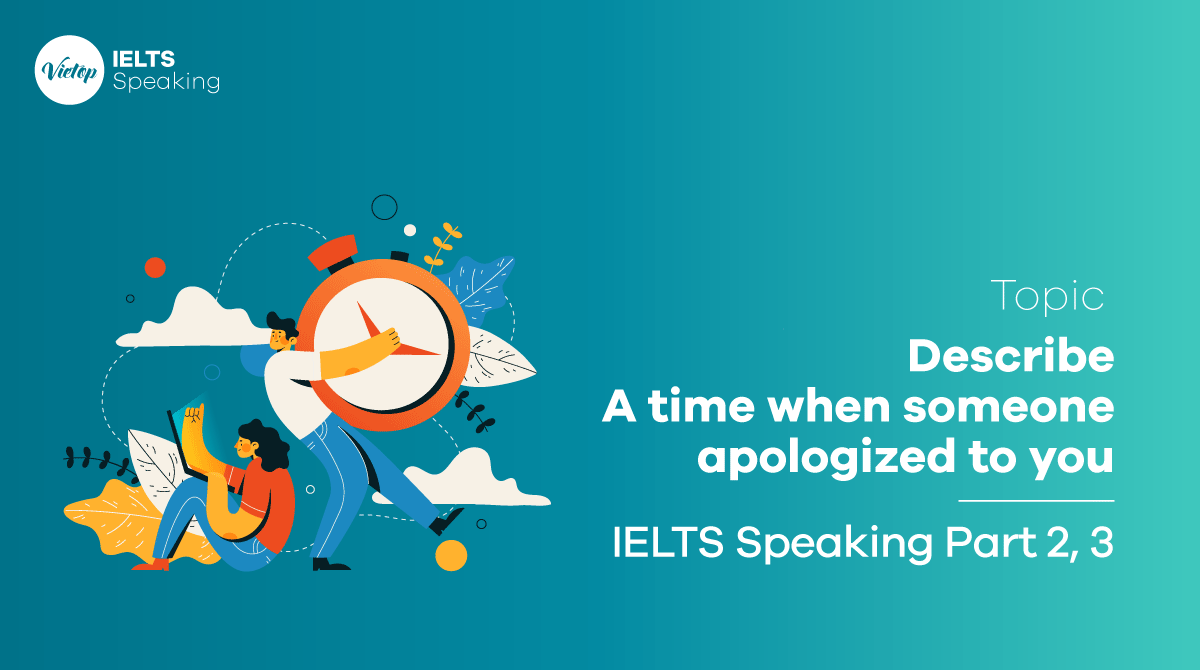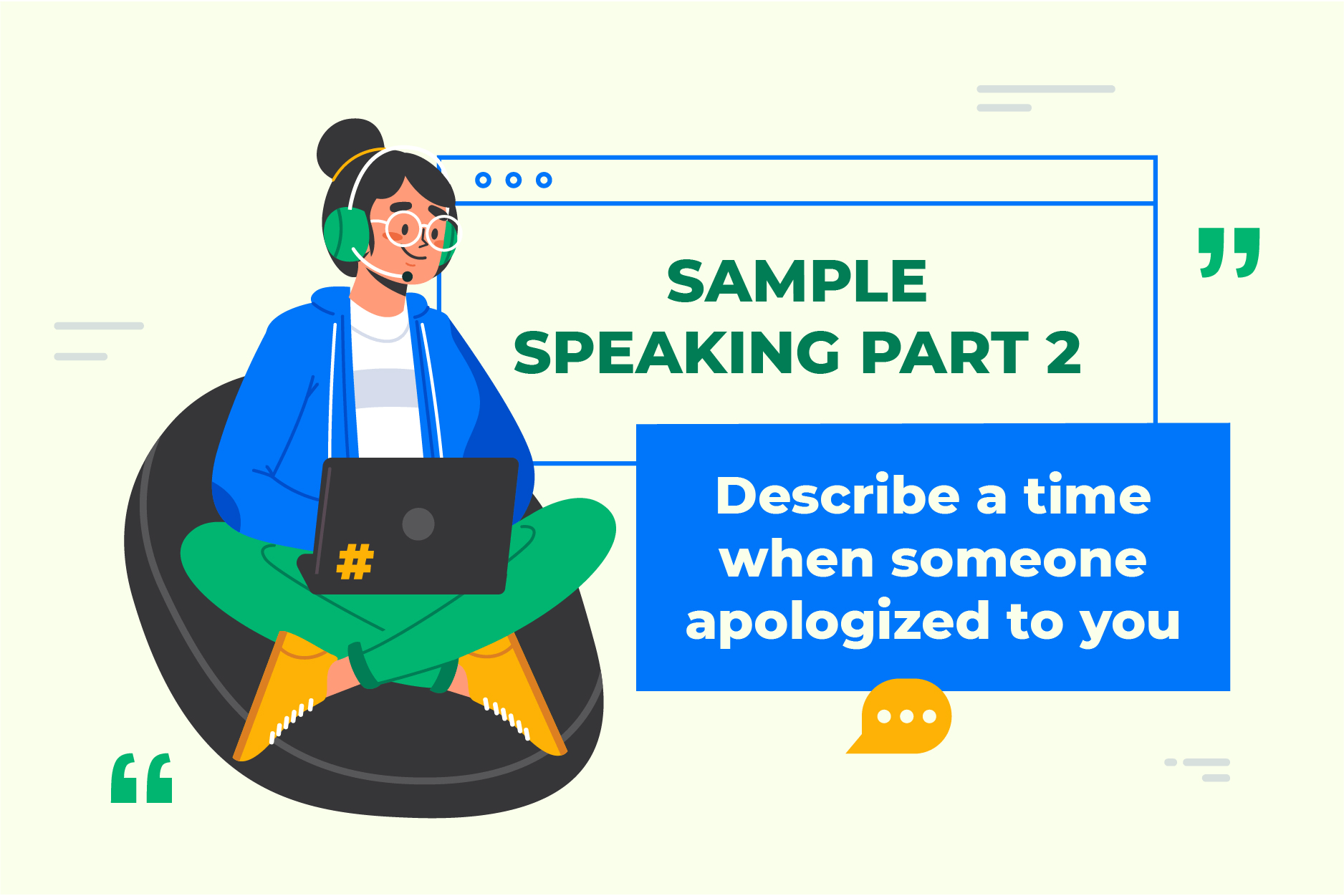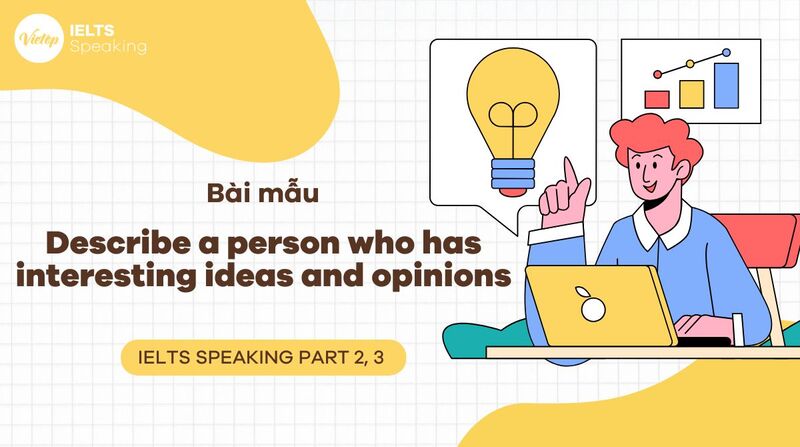Hôm nay, Vietop English giới thiệu bài mẫu câu trả lời IELTS Speaking Part 2, 3: Describe a time when someone apologized to you. Đề bài này yêu cầu bạn phải kể lại một trải nghiệm, do đó chúng ta nên chú ý canh chuẩn thời gian khi nói để không bị quá dài dòng nhé!
Đề bài describe a time when someone apologized to you
Trước hết, bạn có thể gặp đề bài xoay quanh việc kể lại một lần mà ai đó xin lỗi bạn như sau:

| Describe a time when someone apologized to you. You should say: When it was Who this person is Why he or she apologized to you And how you felt about it |
Từ vựng describe a time when someone apologized to you
Dưới đây là một số từ vựng hữu ích mà bạn có thể sử dụng trong phần IELTS Speaking Part 2, 3: Describe a time when someone apologized to you.
- Acknowledge – nhận thức, công nhận, biết – I appreciate that you acknowledged your mistake and apologized.
- Admit – thừa nhận – It takes courage to admit when you’re wrong, and I respected him for that.
- Apology – xin lỗi – Her heartfelt apology made me feel much better.
- Atone – bù đắp – He tried to atone for his mistake by doing something nice for me.
- Compensate – đền bù, bồi thường – The company compensated me for the damages caused by their mistake.
- Contrite – ăn năn – His contrite expression showed that he was truly sorry.
- Apologetic – ăn năn, hối hận – She was very apologetic and kept apologizing for her mistake.
- Correct – sửa đổi, sửa chữa – He realized his mistake and immediately corrected it.
- Forgive – tha thứ – I was able to forgive him once he apologized and made things right.
- Guilty – tội lỗi – He looked guilty and ashamed of his mistake.
- Humble – khiêm tốn – Her humble apology made me feel like she truly regretted her mistake.
- Inconvenience – bất tiện – I was inconvenienced by their mistake, but they apologized and made it right.
- Make amends – đền bù – He attempted to make amends for his mistake by offering to help me.
- Mistake – lỗi lầm – I could tell he was genuinely sorry for his mistake.
- Miscalculation – tính toán sai, sai lầm – It was a miscalculation on his part, but he apologized and made it right.
- Misstep – lỡ lầm, sai lầm – It was a misstep on his part, but he apologized and took responsibility for his actions.
- Omission – sai sót, bỏ sót – His omission of an important detail caused some issues, but he apologized and corrected it.
- Overlook – bỏ qua – It was a simple mistake that was overlooked, but he apologized and made it right.
- Pardon – tha thứ – I was willing to pardon her mistake once she apologized and made things right.
- Penitent – hối hận – He appeared penitent and genuinely remorseful for his mistake.
- Rationalize – hợp lý hóa, biện bạch cho – He tried to rationalize his mistake, but eventually apologized and took responsibility for it.
- Reconcile – hòa giải – We were able to reconcile once he apologized and made things right.
- Regret – hối hận – He expressed deep regret for his mistake and apologized sincerely.
- Repentant – ăn năn – She was very repentant and kept apologizing for her mistake.
- Responsibility – trách nhiệm – He took responsibility for his mistake and apologized sincerely.
- Sincere – chân thành – Her sincere apology made me feel like she truly cared about making things right.
- Sorry – xin lỗi – He said sorry for his mistake and promised to make it right.
- Sympathetic – đồng cảm, thông cảm – She was sympathetic to my situation and apologized for any inconvenience caused.
- Tactful – tế nhị – Her tactful apology made me feel like she was genuinely sorry for her mistake.
- Wrongdoing – hành vi sai trái – He apologized for his wrongdoing and promised to make things right.
Xem thêm:
Bài mẫu IELTS Speaking Part 2: Describe a time when someone apologized to you

Gợi ý dàn bài Describe a time when someone apologized to you
Mở bài – giới thiệu bối cảnh
Ở phần mở đầu, bạn có thể giới thiệu sơ qua về bối cảnh của câu chuyện. Chú ý tránh việc “mở bài” dài dòng như trong văn viết vì ta chỉ có khoảng 2 phút để nói trong IELTS Speaking Part 2 mà thôi.
Thân bài – mô tả
Mô tả, kể lại câu chuyện theo hướng dẫn của phần “you should say”:
- Chuyện xảy ra khi nào, ở đâu
- Ai làm gì có lỗi với bạn
- Họ xin lỗi như thế nào
- Mọi thứ kết thúc ra sao và bạn cảm thấy thế nào qua trải nghiệm
Kết bài – tóm lược lại
Với phần kết thúc, hãy tóm lược lại mọi thứ trong 1, 2 câu ngắn ngọn. Bạn có thể bỏ qua phần này nếu không đủ thời gian. Nhưng hãy chú ý truyền tải toàn bộ câu chuyện đầy đủ theo yêu cầu đề bài.
Xem ngay: Cách phát âm ed trong tiếng Anh chuẩn nhất
Mời bạn cùng nghe Podcast bài mẫu Part 2 của Vietop English nhé:
Để làm được các dạng bài IELTS Speaking part 2, 3 với chủ đề Topic describe a time when someone apologized to you. Bạn cần những kỹ năng nói, nghe, đọc và viết. Nhưng để thành thạo các kỹ năng này rất khó để tự học. Với khoá học IELTS cấp tốc tại Vietop English. Bạn có thể phát triển tư duy bản thân theo cách mình muốn, không phải sợ sai và nhầm lẫn khi đã có thầy cô Vietop hỗ trợ tận tâm, tận tình giúp đỡ bạn khi bạn gặp khó khăn trong bất kì dạng bài nào và cả khi giao tiếp.
Ngoài ra, khóa học luyện thi IELTS Cấp tốc được thiết kế đặc biệt để đáp ứng nhu cầu của những bạn muốn nhanh chóng nâng cao điểm số và đạt được kết quả xuất sắc trong thời gian ngắn. Đăng ký ngay! Đừng bỏ lỡ cơ hội phát triển bản thân nhé!
Bài mẫu Describe a time when someone apologized to you
I’d like to talk about a time when someone apologized to me. It happened a few years ago when I was working at a retail store. I had just started my shift and was organizing some items on the shelves when a customer approached me and asked for help finding a specific product. I was happy to assist her and showed her where the product was located.
However, after a few minutes, the customer returned to me and said the product was not what she was looking for. She raised her voice and berated me for not being helpful enough. I was taken aback by her sudden outburst and felt really upset.
Just then, my manager walked by and noticed the commotion. She immediately stepped in and apologized to the customer on my behalf. She explained that I was new to the job and still learning the ropes and that we would do everything we could to make things right.
The customer eventually calmed down and expressed regret for her behaviour before leaving the store. Later, my manager pulled me aside and reassured me that I was doing a great job, and that I shouldn’t take it personally. She acknowledged the difficult situation and offered words of encouragement, which helped me feel better about the incident.
I felt relieved and grateful for my manager’s support. Her apology made me feel valued as an employee and gave me the confidence to keep working hard. I think it was a good lesson on how to handle difficult customers and how to show empathy towards others.
- Retail store (n): cửa hàng
- Shift (n): ca làm việc
- To approach (v): tiếp cận
- Specific (adj): đặc biệt
- To berate (v): nhiếc móc
- To be taken aback (v): bị ai đó, cái gì đó làm sửng sốt
- Outburst (n): bộc phát (giận dữ)
- Commotion (n): hỗn loạn, sự ồn ào
- To step in (v): xen vào
- On someone’s behalf: thay mặt cho ai đó
- To learn the ropes: học hỏi cách thức làm một việc gì
- To pull someone aside: đưa ai sang chỗ khác nói chuyện riêng tư
- To reassure (v): trấn an
- Incident (n): sự việc
- Relieve (adj): nhẹ nhõm
- Grateful (n): sự biết ơn
- To handle (v): kiểm soát
- Empathy (n): sự đồng cảm
Xem thêm:
- Describe A Skill You Can Teach Others
- Describe A Party That You Enjoyed
- Describe Something That Surprised You
- Describe a time when you had a problem with a piece of equipment
Bài mẫu IELTS Speaking Part 3: Describe a time when someone apologized to you
Mời bạn cùng nghe Podcast bài mẫu Part 3 của Vietop English nhé:
On what occasion do people usually apologize to others?
People usually apologize to others when they make a mistake or cause harm, are running late or have to cancel plans, or want to show respect and maintain positive relationships. Apologizing is a powerful way of acknowledging our mistakes and taking responsibility for our actions, and can help to build trust and compassion in our relationships with others.
- Harm (n): làm hại, gây hại
- Maintain (v): gìn giữ
- Powerful (adj): mạnh mẽ
- Trust (n): niềm tin, sự tin tưởng (vào ai đó hoặc điều gì đó)
- Compassion (n): lòng trắc ẩn
Xem thêm bài mẫu Speaking:
- Bài mẫu topic Transportation – IELTS Speaking part 1
- Bài mẫu The area that you live – IELTS Speaking Part 1
- Bài mẫu IELTS Speaking part 1: Topic Writing – Topic In Relationship – Bài mẫu IELTS Speaking part 1, 2, 3
Do people in your country like to say “sorry”?
I think in Vietnam, people generally value politeness and respect for others, but the cultural norms around apologizing may differ. In some cases, we Vietnamese may be more reserved when it comes to apologizing, especially in situations where they feel that it might cause us to lose face or damage our reputation. However, this can vary depending on the individual and the specific situation. In general, it is still considered important to show respect and consideration for others, and many people in Vietnam will apologize when they feel that they have made a mistake or caused harm to someone else.
- To value (v): trân trọng
- Cultural norms (n): các chuẩn mực văn hóa
- Politeness (n): sự lịch sự
- To reserve (v): kín đáo
- To lose face (v): mất mặt
- Reputation (n): danh dự
- Consideration (v): sự kính trọng
Do you think people should apologize for anything wrong they do?
Yes, I believe that people should be sorry for their wrongdoings. Apologizing is an important way of acknowledging our mistakes and taking responsibility for our actions. It shows that we recognize the impact of our manners on others. By apologizing, we can help to restore trust and repair relationships that may have been damaged by our actions. Of course, it is also important to follow up our apology with actions that demonstrate our commitment to making things right.
- Impact (n): ảnh hưởng
- Manner (n): hành vi, thái độ
- Demonstrate (n): thể hiện
- Commitment (n): sự cam kết
Luyện tập IELTS Speaking với bài mẫu IELTS Speaking part 1 và IELTS Speaking part 2 nhé!
Why do some people refuse to say “sorry” to others?
Some people may refuse to apologise because they feel that it would be an admission of guilt or weakness, they genuinely do not believe that they have done anything wrong, or they have difficulty empathizing with others. Refusing to say sorry can be destructive to both the individual and the relationship, and it is important to cultivate the ability to apologize when we make mistakes in order to promote understanding, compassion, and healthy relationships with others.
- Admission (n): sự thú nhận
- Weakness (n): điểm yếu
- Genuinely (adv): chân thật, thật sự
- Destructive (adj): phá hủy
- To cultivate (v): vun đắp
- To promote (v): khuyến khích, thúc đẩy
Trên đây là bài mẫu IELTS Speaking part 2, 3: Describe a time when someone apologized to you, hy vọng bài viết sẽ là nguồn tham khảo tốt cho các bạn trong việc học và chuẩn bị cho kỳ thi IELTS. Chúc các bạn học tốt!









